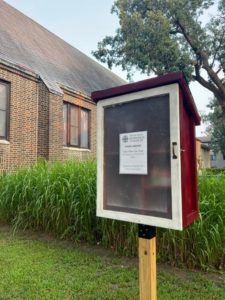Little Food Pantry
A growing movement in community enrichment efforts has been the “free little pantry” initiative.

A Free Little Pantry is a free-standing, fabricated structure that sits on the property of the church. There are easy and accessible building instructions to these structures, available on the littlefreepantry.org. This website is also a useful resource for navigating city and state zoning laws, though these pantries are generally able to be constructed and used without any kind of local permit.
Rather than adhering strictly to the “take what you need / leave what you can” model, a parish food pantry would be entirely geared towards stocking the pantry themselves, expecting no replenishment from the local community. This one-way donation structure differs from the Little Free Pantry movement in that it places the responsibility of the pantry’s replenishment firmly in the hands of the parish community.
This model for food distribution has marked advantages for smaller and more remote parishes, but it can be easily translatable to larger/more urban contexts. Utilizing the pantry, parishioners are able to focus their efforts on donating non-perishable goods and toiletries towards a delivery system that requires little observation and maintenance. Anyone in need can simply walk up to the pantry, take what they need, and go on their way.
Small parishes that are not yet ready to organize or facilitate a traditional community meal can still offer up donations to their immediate local community, in a way that communicates good will and visually identifies the church as a place of help.
Project Requirements –
The fabrication and maintenance of a plywood structure, placed on church property. Blueprints available online, construction is simple and requires no more than 2 people.
The regular donation of non-perishable items by the parish community, such as:
Canned Food
Dry Goods
Hygiene Products
Hand Warmers, Socks, Gloves
